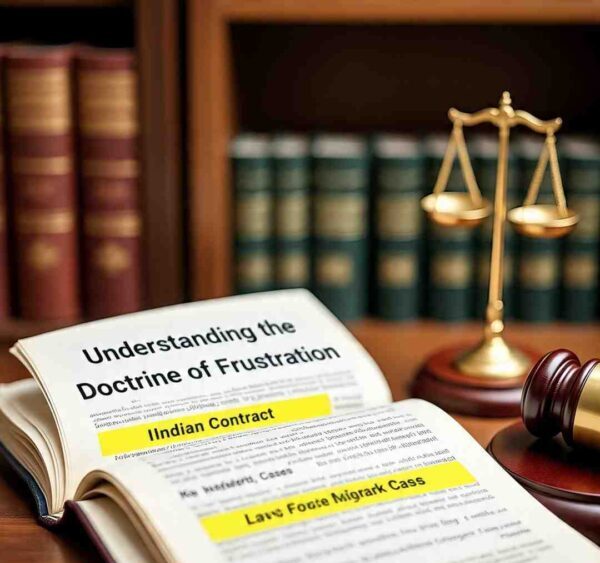Examine the principles governing the Doctrine of Frustration as outlined in Section 56 of the Indian Contract Act, 1872. Understand its elements, relation to force majeure, and key case laws in the Indian legal context.
Introduction
The Doctrine of Frustration, as encapsulated in Section 56 of the Indian Contract Act, 1872, plays a pivotal role in contract law. It addresses situations where a contract becomes impossible to perform due to unforeseen and uncontrollable events that arise after the agreement has been entered into. This principle ensures that neither party is unfairly penalized for circumstances beyond their control, thereby maintaining the fairness and viability of contractual obligations in unforeseen scenarios.
Although the Indian Contract Act does not explicitly define force majeure, the concept operates in close association with the doctrine of frustration. While force majeure clauses are contractually inserted to deal with specific eventualities, frustration acts as a statutory remedy in the absence of such provisions. This article delves into the essential elements of the doctrine, its interplay with force majeure, and the landmark judicial decisions that have shaped its interpretation in India.
Key Elements of the Doctrine of Frustration
The application of the doctrine of frustration depends on several critical elements that determine its scope and legal effect:
Unforeseen Events
Unforeseen events that were beyond the contemplation of the parties at the time of entering into the contract give rise to frustration. These occurrences must be completely outside the contemplation of the parties and should not stem from any act or omission on their part. Natural disasters, government actions, war, and other extraordinary events are typically considered under this head.
Radical Change in Circumstances
To constitute frustration, the event must lead to a fundamental alteration in the contractual terms and their intended performance. It is not enough for the performance to become more difficult or expensive; the contract must essentially be transformed into something significantly different from what was originally agreed upon.
Absence of Fault
The doctrine only applies when neither party is at fault. If the impossibility arises due to the negligence or willful conduct of any party, frustration cannot be claimed. It must be a consequence of external factors entirely beyond human control.
Impossibility or Illegality of Performance
The most crucial criterion is that the contract must become either impossible to perform or illegal due to the intervening event. Mere inconvenience, delay, or increase in cost does not suffice. The impossibility must be such that fulfilling the contract is no longer feasible under law or in practical terms.
Force Majeure and Its Intersection with the Doctrine of Frustration
Force majeure, while established through contract terms, overlaps in principle with the legal doctrine of frustration. A force majeure clause typically lists specific events—such as earthquakes, floods, pandemics, or government restrictions—that excuse non-performance without liability.
However, there are key differences:
- Specificity vs. Generality: Force majeure clauses are explicit and tailored, while frustration deals with implied and unforeseeable events not covered by any clause.
- Pre-emptive vs. Reactive: Force majeure is agreed upon beforehand, while frustration applies after an unforeseen event occurs, filling the legal gap where no such clause exists.
- Legal Recognition: Indian courts have acknowledged that in the absence of a force majeure clause, Section 56 can be invoked, provided the criteria for frustration are met.
Therefore, while both concepts aim to relieve parties from obligations during uncontrollable events, frustration is the default legal doctrine when the contract remains silent on such matters.
Landmark Judicial Pronouncements
Several important cases have helped shape the legal understanding of the doctrine of frustration in India:
Satyabrata Ghose v. Mugneeram Bangur & Co. (1954)
This Supreme Court case laid the foundational interpretation of Section 56. The court emphasized that frustration applies when an event causes a fundamental alteration in the contract, not just minor delays or economic hardship. The judgment clarified that the impossibility may be physical or practical.
Taylor v. Caldwell (1863)
Although a British case, Taylor v. Caldwell has had a significant influence on Indian contract law. The court ruled that when a music hall was destroyed by fire, a contract for its use became frustrated. This introduced the principle that destruction of the subject matter can render a contract void.
Murlidhar Chiranjilal v. Harishchandra Dwarkadas (1962)
In this case, the government requisitioned goods that were meant to be sold under contract. The Supreme Court held that such an act, which made performance legally impossible, amounted to frustration. It reiterated the requirement of a fundamental change in circumstance, aligning with Section 56.
Conclusion
The Doctrine of Frustration under the Indian Contract Act, 1872, serves as a legal remedy to protect parties from unforeseen circumstances that make performance impossible, illegal, or drastically different from what was initially agreed. It ensures fairness and legal certainty when external events disrupt the execution of contracts. While force majeure clauses provide a contractual shield, frustration operates as a statutory fallback, ensuring that contracts are not enforced in situations where performance is no longer viable. Understanding the doctrine is crucial for both legal professionals and businesses involved in drafting and executing contracts in a dynamic and unpredictable world.
Frequently asked questions:
What is the Doctrine of Frustration under Indian law?
The Doctrine of Frustration, as defined under Section 56 of the Indian Contract Act, 1872, states that a contract becomes void if an unforeseen event occurs after its formation, making the performance of the contract impossible, illegal, or radically different from what was originally agreed.
What are the key elements required for the frustration of a contract?
The essential elements include:
An unforeseen or supervening event;
No fault of either party;
Impossibility or illegality of performance;
A fundamental or radical change, like the contract.
What is a force majeure clause?
A force majeure clause is a provision in a contract that lists specific events (e.g., natural disasters, war, pandemics) that excuse non-performance without liability if those events prevent fulfillment of the contract.

























